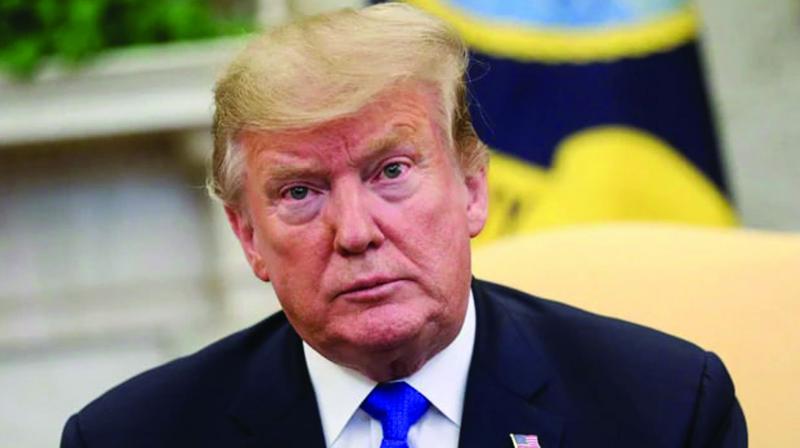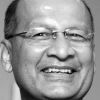Meeting Kim at DMZ an astute move by Trump
There are enough pointers that it was a carefully choreographed encounter with a veneer of spontaneity, for maximum impact.

An iconoclast and a compulsive showman, nothing appears to be beyond the mercurial incumbent of the White House, Donald Trump, who has turned diplomatic norms and niceties on their head. Daughter Ivanka is a “beauty” and secretary of state Mike Pompeo is a “beast”. In full public view in Osaka, at the G-20 summit, he tells Russia’s President Vladimir Putin not to meddle in the American electoral process — and the former KGB boss just grins!
Mr Trump also “fell in love” with Kim Jong-un (KJU), the ruthless dictator of North Korea (DPRK), who is half his age and writes him — “beautiful letters and they’re great letters”. And therefore, on an impulse on June 29, Mr Trump tweets: “… I will be leaving Japan for South Korea (with President Moon). While there, if Chairman Kim of North Korea sees this, I would meet him at the Border/DMZ just to shake his hand and say hello (?)!” Of course, Kim saw the tweet and North Korea’s first vice-foreign minister Choe Son-hui responded with unprecedented promptitude, terming it as “a very interesting suggestion”, according to the Korean Central News Agency (KCNA).
Merely a day later, a beaming Kim Jong-un escorted Mr Trump to his part of the country at the DMZ (demilitarised zone), the de facto inter-Korean border since the 1953 armistice. No other serving US President had ever set foot on North Korean soil. Mr Trump was euphoric — “…it’s just an honour to be with you, and it was an honour that you asked me to step over that line. And I was proud to step over the line. I thought you might do that; I wasn’t sure. And I want to thank you. It’s been … a very historic meeting.” He promptly invited KJU to Washington for the next formal summit. They also held an hour-long agenda-less meeting, while President Moon played the perfect host, and waited patiently.
How spontaneous was Mr Trump’s tweet to invite Mr Kim for a handshake? Why did he take so much trouble to humour KJU? What purpose did the brief meeting serve? Did China have a role to play this time around?
There are enough pointers that it was a carefully choreographed encounter with a veneer of spontaneity, for maximum impact. Koreans are anything but spontaneous, believing firmly in planning everything to perfection. Earlier in the month, Mr Trump and Mr Kim had again exchanged personal letters. Mr Trump said on June 11 that he had received a very warm and “beautiful letter” from Mr Kim. No details were disclosed. Next, on June 21, KJU got a letter from Mr Trump, which had “excellent content”. Kim promised to “seriously contemplate” and appreciated the “extraordinary courage of President Trump”, according to KCNA.
On June 24, President Moon, who has been deftly mediating between Washington and Pyongyang, confirmed: “Both sides have been engaged in a dialogue in regard to a third summit… I believe everything has now fallen into place for that to happen.” On June 28, Stephen Biegun, US special envoy for North Korea, in a meeting with his South Korean counterpart Lee Do-hoon, assured that the US was “ready to engage in constructive discussions with the DPRK to make progress simultaneously and in parallel towards the commitments between Trump and Kim at the Singapore summit”, according to a South Korean foreign office release.
Hitherto the US had been demanding a unilateral “complete, verifiable and irreversible denuclearisation”, or CVID, by the DPRK without diluting sanctions or taking any reciprocal steps. Given the huge trust gap between the two capitals and the American propensity of resiling on its commitments — last year Mr Trump nonchalantly pulled out of the Iran nuclear deal that President Barack Obama and other nations had so laboriously concluded in 2015 — there was no question of DPRK giving away its WMD arsenal, which is its insurance against regime change.
It appears that the Americans had attempted to ambush Mr Kim at Hanoi during the second bilateral summit on February 27-28. Intense negotiations had taken place between the two sides at various levels since the June 2018 Singapore summit. In September 2018, DPRK had pledged to “permanently dismantle” the Intercontinental Ballistic Missile (ICBM) engine test and launch site at Tongchang-ri, in the presence of inspectors, as also the critical Yongbyon nuclear facility, if the US took “corresponding steps”. He had all along been insisting on gradual and reciprocal steps. Beijing and Seoul support this position. The US, citing the track record of the DPRK’s “double-dealing”, has been in two minds. Of late, under the influence of hardliners like NSA John Bolton, the American negotiators had adopted a muscular no-concessions approach, which was a non-starter with DPRK.
Having had to return empty-handed from Hanoi was a huge setback for Mr Kim. The engagement process appeared to have been derailed. Accusations and counter-accusations had begun to be made. However, Mr Kim and Mr Trump maintained their surface cordiality, professing respect for each other. Thus the US had to take the lead to undo the damage. A handshake at the DMZ, Mr Trump’s symbolic “visit” to the northern side and brief talks, without expectations, not only made for good optics but also gave bragging rights to Kim Jong-un. Significantly, Pyongyang’s bugbear, John Bolton, though physically present, was excluded from the American delegation. He was also dropped from the designated negotiating team, to prepare for the third formal summit in Washington, which would be headed by the two foreign ministers, and assisted by Biegun and Choe.
President Xi Jinping, who visited Pyongyang on June 21-22, virtually on the eve of his much-anticipated meeting with Mr Trump at the G-20 sidelines, made a similar pitch. He spoke in favour of the US and DPRK leaders maintaining dialogue and contact, meeting each other halfway and restarting the talks at an early date.
By every yardstick, the DMZ event was an astute diplomatic manoeuvre by Mr Trump. The talks are back on track. Yet the serious gulf remains, entailing gruelling negotiations. KJU has been made to look good. President Moon, though excluded from the iconic handshake by Mr Kim and Mr Trump, has reinforced his credentials as a peacenik. Mr Trump’s stock has risen further with his domestic constituency, as have his hopes of bagging the Nobel Peace Prize!

